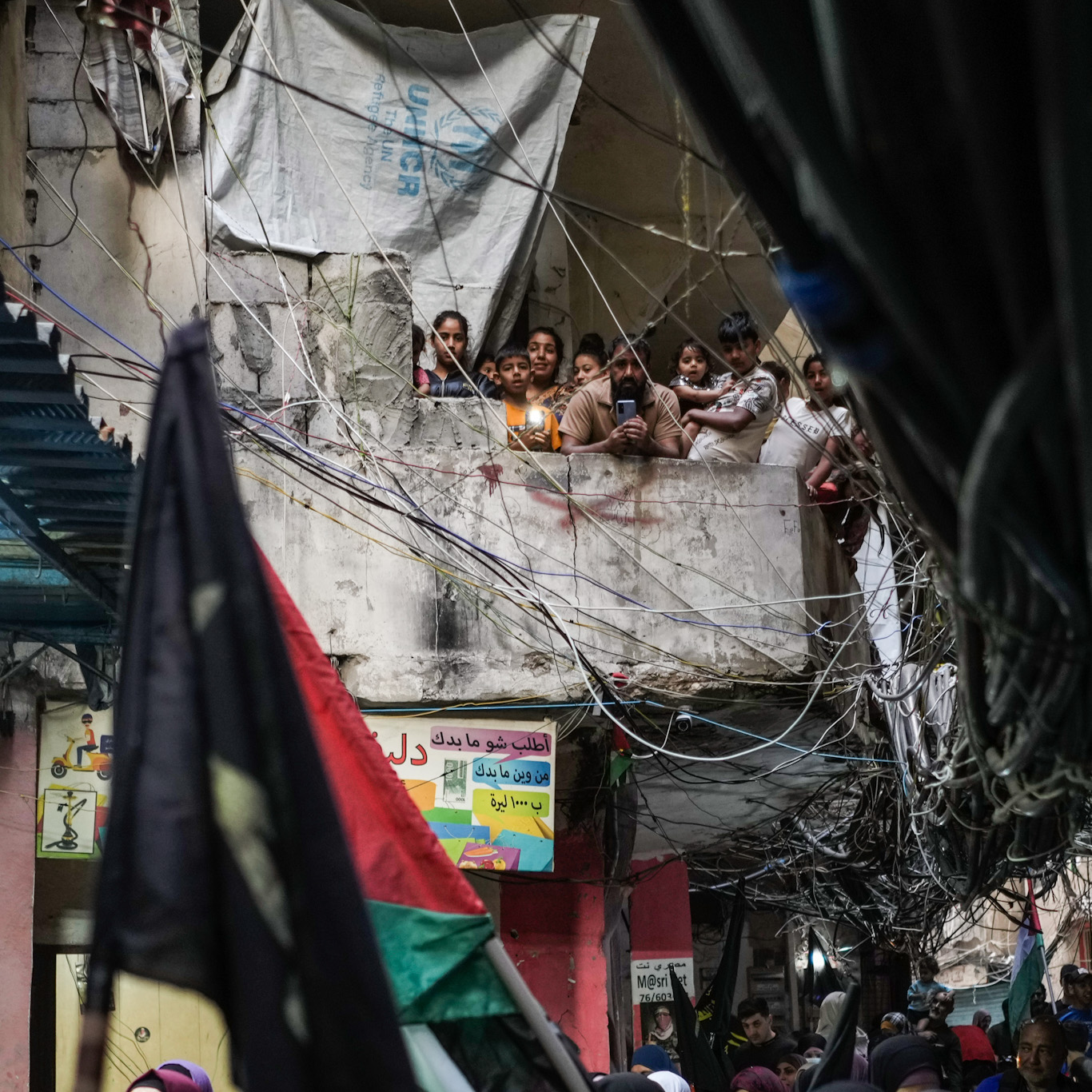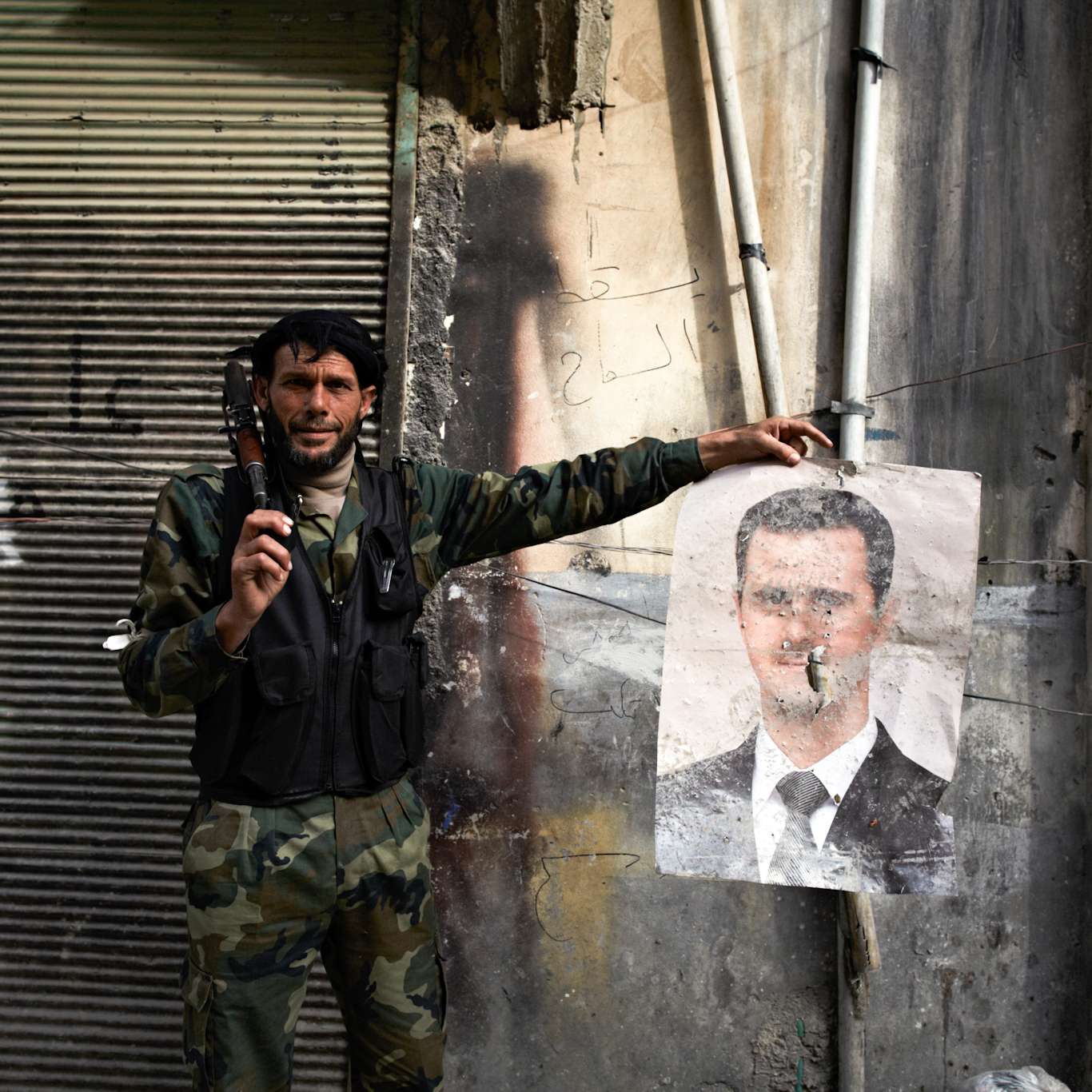Leaked files obtained by MintPress News detail the intensive interest taken in Palestinians both within and without the country by British intelligence operatives and Foreign Office-funded and directed cutouts over many years. Collectively, the material leaves little room for doubt that the British government has long sought to covertly surveil, infiltrate, and manipulate Palestinians for malign ends while exploiting their suffering to serve London’s geopolitical objectives.
Throughout the Syrian proxy conflict, British intelligence ran expansive psychological warfare programs, targeting the local population and Western citizens. The objective was to destabilize Bashar Assad’s government and convince domestic and foreign audiences, including overseas governments and international bodies, that the Western-backed Free Syrian Army was a moderate, legitimate alternative and flood media globally with pro-opposition propaganda. A corrupt constellation of private contractors staffed by British military veterans and “former” spies delivered these clandestine campaigns.
Innovative Communications & Strategies (InCoStrat) was a particularly prolific participant in this effort. The firm was founded by Paul Tilley, Britain’s former Ministry of Defence head of communications for West Asia, and Emma Winberg, a longtime MI6 officer, who subsequently married now-deceased White Helmets founder James Lemesurier. The leaked documents reveal that in Syria, she was tasked with the “management and development” of a local “network of interlocutors, key leaders and local coordinators”:
[This network is] able to assist in the development of messages and influence through word of mouth, in difficult to reach areas. The knowledge gained through these interactions will generate the contextual understanding that provides the foundation for our communication campaigns, our ability to assess their effect and to provide detailed atmospheric reports that inform HMG of the developing situation in Syria.”
Winberg is described as Britain’s “lead on engagement with the Syrian armed opposition in Istanbul” while serving as a Foreign Office “Political-Military Officer” in Turkey from 2013 onwards. She cultivated “an extensive range of contacts in north and eastern Syria,” meaning she was “trusted and respected by moderate opposition leadership figures.” This may account for why InCoStrat avowedly “maintained a perfect record of safety and security for its staff” in the country, even while the company secretly operated in “areas under ISIS control.”
Winberg harvested so much crucial intelligence in this role that her resultant insights represented a “core contribution” to British, European and US understanding and assessment of armed groups in Syria. Intriguingly, she was transferred to Istanbul directly from the British consulate in Jerusalem, a vital regional base of operations for MI6. While there, she reported on “violent extremist organizations” active in Gaza, “including during Operation Cloud Pillar” in November 2012, for which she was “commended internally.”
Cloud Pillar saw Israeli Occupation Forces massacre almost 200 Palestinian civilians after assassinating high-ranking Hamas commander Ahmed Jabari. This was in keeping with MI6’s strategy to “degrade the capabilities” of “rejectionists” of the pro-Zionist Palestine Authority. Winberg’s close-range view of these events made her a compelling candidate for overseeing London’s contribution to the proxy war from the perspective of her employers in British intelligence. Moreover, she was not alone among InCoStrat operatives in secretly surveilling Palestinian resistance firsthand.
One company staffer managed a $25 million “small grants programme to directly support community stabilisation, engage youth, and moderate actors in the Palestinian Territories” for US intelligence cutout USAID, 2005 – 2007. This placed them on the frontline of the Zionist entity’s embarrassing defeat by Lebanon’s Hezbollah in the summer of 2006 and concurrent “military incursion” in Gaza.
Along the way, they “reported on the political, economic, and security situation” locally, “including extensive reporting during internal instability in Gaza.” Meanwhile, another InCoStrat operative’s CV boasts that they “travelled and studied in Israel and Palestine, focusing on religious political movements,” then “studied Palestinian refugees in Syria before the uprising.” After that, they “worked with and trained Syrian activists in several different organisations.”
‘Improved Conditions’
It is a supremely striking feature that multiple InCoStrat operatives went straight from intently “studying” Palestinian refugees and armed groups to cloak-and-dagger management of the “moderate” Syrian opposition. In this context, what are we to make of the fact that British intelligence cutouts have, for many years, been heavily active in Lebanon’s Palestinian refugee camps? Around 300,000 Palestinian refugees inhabit Lebanon, roughly half of them in camps administered by the United Nations Relief and Works Agency (UNRWA).
Living conditions are appalling, with overcrowding, poverty, and rampant unemployment. Discrimination towards Palestinian refugees at both a public and state level is commonplace. This intensified significantly due to untold numbers of displaced people – among them many Palestinians – pouring into Lebanon from neighboring Syria as a result of the grinding, 11-year Western proxy war against Damascus. Such a milieu inevitably produces a wide array of grievances among refugees, which can be malignly exploited by British intelligence.

Since 2009, Foreign Office contractor ARK—founded and run by MI6 operative Alistair Harris—has operated in Lebanon’s 12 Palestinian refugee camps. In leaked files, the company boasts of its “granular understanding” of the camps’ internal political, economic, ideological, religious and everyday dynamics. ARK’s voluminous “local contacts” have “access throughout all camps and gatherings.” This means that community-level discussions and activities of all residents can be influenced and spied upon, as required.
Such everyday, real-life insight is augmented by “daily monitoring of neighborhood-level WhatsApp groups.” Meanwhile, local engagement with a social media platform created by ARK, Nastopia, is heavily monitored. The page, run by a 24-strong team of ARK-trained “youth reporters,” is intended to increase demand for “community engagement and improved conditions” among camp residents. It promotes covertly Foreign Office-financed projects in the camps as “success stories” while serving “as a forum for online and offline discussion about social injustices [and] virtual space to talk about topics considered taboo in the camps.”
ARK has spearheaded various community initiatives elsewhere in the “offline” realm. These include repairing and restoring streets and cemeteries, recycling, promoting small businesses, providing welfare to disadvantaged and disabled residents, managing nurseries and daycare centers, and even launching a local coffee shop. The leaked files describe this as “a popular place for youth to gather and promote civic engagement in their community and a shared Palestinian identity that bridges factional differences.” ‘
Contentious Politics
Insidious surveillance and manipulation components of these projects aside, one might reasonably argue that given the harsh internal environments of Palestinian refugee camps in Lebanon, any effort to regenerate and improve conditions for residents of all ages and create a sense of community is a net positive. Yet, the ultimate purpose of these projects is to create a secret army of anti-government activists, which can be activated to stir up trouble if and when British intelligence wishes.
Of course, the leaked documents do not frame that objective in such terms. One file refers to the value of highlighting “success stories” in the camps as “enhancing the audience’s confidence in their own ability to contribute to social change.” In other words, encouraging Palestinian refugees to take matters into their own hands. This intention is articulated far more emphatically in a leaked March 2019 study conducted by ARK.
The document identified a segment of Beirut’s diverse population that could be united in opposition to Lebanon’s government and therefore mobilized to “affect positive social change” on their own initiative. The ideal target group was comprised of individuals who disavowed violence but not “other forms of contentious politics” and could be “influenced” to engage in certain “behaviors,” such as protests, leafleting campaigns, and other community initiatives. The analysis explicitly characterized Palestinian refugees as an “important part” of such an effort.
Therefore, ARK pledged to both covertly and overtly promote the message that “change is possible and ordinary citizens have a role to play in achieving change” through propaganda campaigns and civil society initiatives. These would “highlight where change has been achieved or where threats to Lebanon’s stability have been countered.” In turn, the broader population of Lebanon would be well-educated on how “barriers” to reform can be overcome via direct popular action.
Seven months after ARK produced this study, large-scale protests engulfed the streets of Beirut. Western media immediately spoke of “revolution” in the country. Few outlets acknowledged that the unrest had begun in July of that year, when thousands of refugees inhabiting several camps commenced mass demonstrations, demanding reforms to local employment laws that barred them from numerous professions.
Coincidentally, in one leaked document, ARK boasts of how the company “takes pride” in ensuring refugees recruited to its illicit schemes receive “annual leave, sick leave, and health insurance,” despite this not being “legally necessary” due to local legislation “discriminating against Palestinians.”
‘Future Transitional Syria’
Lebanon was a critical organizing nucleus for the Syrian opposition, which ARK directed and embedded with before the “revolution” started. A document circulated among anti-Assad elements in Beirut in May 2011, secretly intercepted by Syrian security services, set out a blueprint for events in the uprising to date and precisely what would subsequently transpire in Damascus.
The opposition proposed convening mass demonstrations in every major Syrian city so security forces “will lose control of all regions,” be “taken unaware,” and become “exhausted and distracted.” This, along with “honest officers and soldiers” joining “the ranks of the revolution,” would make “toppling down the regime” straightforward. Any crackdown on these protests was forecast to precipitate a Western “military strike,” ala Libya. The opposition foresaw major news outlets playing a significant role:
Everyone should be confident that with the continuation of demonstrations today, media channels will have no choice but to cover the events…Al Jazeera will be late due to considerations of mutual interests. But we have Al Arabiya and Western media channels who will come forward, and we will all see the change of tone in covering the events and demonstrations will be aired on all channels and they will have wide coverage.”
The Assad government did not choose to publicize this bombshell file for unclear reasons. It only became publicly available – and translated into English – through the work of the Commission for International Justice and Accountability (CIJA). The organization was spun out of ARK in May 2011 to prosecute Syrian officials for war crimes. Its first act was to covertly train opposition activists “in basic international criminal and humanitarian law” in service of a “domestic justice process in a future transitional Syria.”
As the foreign-fomented crisis escalated into an all-out proxy war, CIJA began employing extremist groups to smuggle sensitive documentation out of abandoned government buildings in opposition-occupied areas of Syria, paying these factions – including al-Nusra Front and ISIS – vast sums for their services. While generating enormous amounts of fawning media coverage, the Commission convicted just two Syrian officials of war crimes, and only after the pair voluntarily defected and made numerous incriminating statements to their Western handlers.

This failure is, of course, attributable to the collapse of the British and US regime change project in Syria. Indeed, the success of CIJA’s business model was wholly contingent on the violent overthrow of Assad and his government. The fact that the Commission was founded before the Syrian Arab Army was even formally deployed to Damascus amply demonstrates that CIJA and ARK had substantial grounds to believe that decisive Western intervention would be forthcoming at the earliest stages of the ‘peaceful revolution.’
Per the intercepted document, so too did opposition activists in Lebanon in May 2011 – the same month CIJA was founded – which, of course, referenced then-ongoing NATO airstrikes on Libya. While such intervention didn’t arrive as expected, arms and fighters promptly began flowing from Tripoli to Syria after that, in direct coordination with MI6. Many insurgents were former members of the Libyan Islamic Fighting Group (LIFG), who were freed from prison four years earlier by Muammar Gaddafi after an intervention from one of the group’s founders, Noman Benotman.
Benotman claimed to have rejected political violence, embraced pacifism and democracy, and pledged to deradicalize the jailed LIFG fighters in return for their release. In 2010, he became President of the UK government-funded Quilliam Foundation, the world’s first “counter-extremism” think tank. In this position, he was instrumental in securing high-level defections from Gaddafi’s government during the civil war. The organization’s avowed contribution to the NATO effort intensified existing suspicions about the spectral interests it might be serving.
After Quilliam shut down in April 2021, veteran journalist Ian Cobain made a startling disclosure. The Foundation had been secretly established by the Office for Security and Counterterrorism (OSCT), a shadowy British intelligence agency. London’s spies had initially planned to fund the venture covertly, “with money appearing to come in from a Middle Eastern benefactor, but channeled by MI6.” Instead, overt government financing was granted, a move “eventually judged within Whitehall to have been a mistake.” An OSCT source lamented:
Should have run it from within the agencies. They do this sort of stuff all the time. And you never find out.”
Palestinian-focused civil society organizations and initiatives are frequently constructed by British intelligence without participants or broader local populations learning the true sponsors and purposes they serve. With Israel openly planning to reconstruct a politically “moderate,” Hamas-free Gaza post-genocide, it is incumbent to reflect on how any proposed replacement leaders will almost inevitably be one way or another “graduates” of MI6-sponsored programs and, therefore, British assets, whether knowingly or not.
Feature photo | A young Palestinian walks through the Palestinian refugee camp of Shatila in Beirut, Lebanon, May 15, 2024. Hassan Ammar | AP
Kit Klarenberg is an investigative journalist and MintPress News contributor exploring the role of intelligence services in shaping politics and perceptions. His work has previously appeared in The Cradle, Declassified UK, and Grayzone. Follow him on Twitter @KitKlarenberg.



